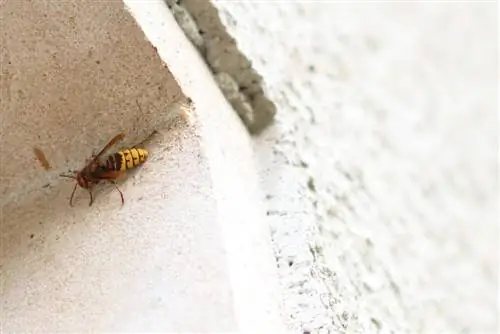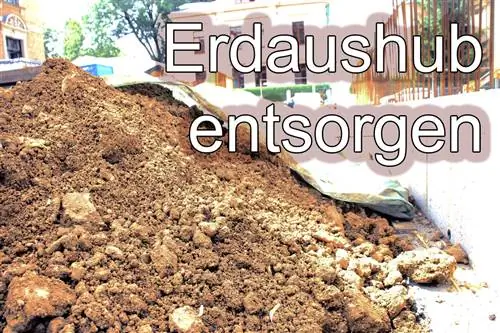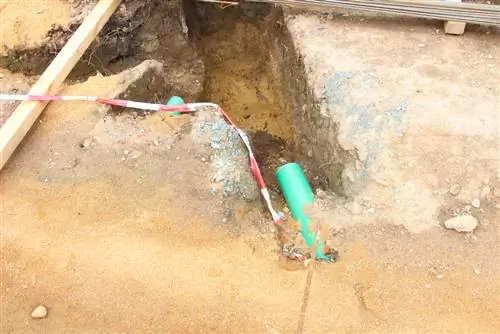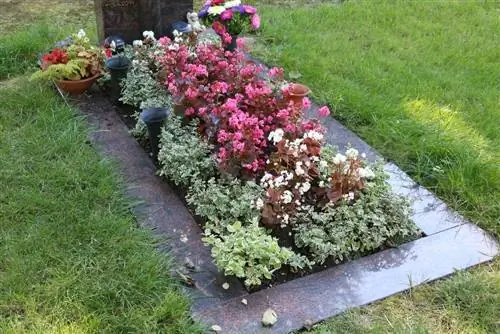- Author admin caroline@plants-knowledge.com.
- Public 2023-12-17 03:39.
- Last modified 2025-01-24 12:45.
Hornets are protected, so a hornet nest may not simply be removed and the hornet swarm may not be destroyed. It is therefore important that if the nest is disturbing or can even harm the he alth of the residents of the house, a specialist can be entrusted with the relocation. Only in exceptional cases is a special permit from the responsible nature conservation authority permitted. However, anyone who violates this will be subject to a heavy fine. The relocation is carried out by the fire department, exterminator or a local beekeeper.
Find Hornet Nest
Suddenly there they are, big, buzzing insects that scare many people. But hornets are not that dangerous and only nest near people, for example in a roller shutter, if the young queens cannot find a suitable nesting place in nature after the winter. They also like to nest in attics, on terraces, doorways or bird boxes. It is now important to find the hornet's nest first. If it is further away from the house, then the insects should not be a problem for a year. However, if the nest was found, for example, at an entrance to a house or in a roller shutter box on the window or patio door, then it must be checked whether it could be dangerous for the residents. This is how a nest can be found:
- If more hornets appear in the garden, listen up
- follow the trajectory
- Nest gives off strange smell
- so follow this one too
- Possible nests are usually hidden in holes
- this is how a nest can be in a hole in the ground
- in a hollow of a tree trunk
- in bushes or trees
- in an attic or in a gable
- and above all to have been built in a roller shutter box
The hornet nests usually reach a considerable size, which can be a meter or longer. The initial shock of finding such a nest can be very great at first. However, people can easily live with the hornets for a summer if the nest is built far enough away from the house.
Tip:
Hornet stings are no more dangerous or poisonous than those from wasps. In addition, the animals only sting if they see themselves, their people or the queen in immediate danger. This danger usually arises when people are too close to the nest.
Is there an acute danger
Hornets that are left alone don't care about the people around them. An attack can only occur if you feel threatened. This is often the case if the nests were built, for example, near a house entrance that is frequently visited and the hornets are therefore disturbed a lot. Especially if there are people in the family who are allergic to wasp venom, an acute danger can also be assumed if hornets are constantly in the vicinity of the house. In such a case, hornet stings can also cause an allergic shock. These two factors
- People with allergies to wasp stings in the family
- Nest built too close to an important house entrance
must be clarified so that any potential danger can be identified and averted. In such cases, homeowners should not be afraid to quickly submit an application to the responsible nature conservation authority, which will issue a special permit for relocation in such cases. The respective nature conservation authority can also help in this case if no need to relocate is seen. Corresponding rules of human behavior towards hornets are shown.
Because the animals are generally not aggressive. If you are not near the nest, you do not have to worry about being attacked and stung. Individual hornets that are near the terrace, balcony or in the apartment can be driven away by certain smells. These smells can also be used to keep the animals away from certain places if the nest has to remain in place over the summer.
Nature conservation
Hornets and their nests are protected and anyone who wants to remove or dispose of them themselves can face a high fine of up to 50,000 euros. A homeowner should therefore never act independently if a hornet's nest is discovered in the garden or on the house. Each city and municipality also has different regulations when it comes to hornet nests. There is no uniform regulation in the country or in the federal states.
Get special permission

The nature conservation authority of the city or municipality in which the corresponding nest was found on or in a house is the first point of contact. In order to remove a hornet's nest, the homeowner needs a special permit. To do this, experts from the nature conservation authority inspect the nest. The homeowner should also provide a medical certificate about a possible allergy of a resident. If the relocation is approved, the authorities will then proceed further:
- Plan to relocate the animals will be drawn up after the inspection
- We are examining how this can be done as gently as possible for the animals
- depending on the location of the nest, creating this plan can take some time
- the applicant must be patient for this
Remove hornet nest and relocate gently
If a beekeeper or other specialist is entrusted with removing the nest from their own property after receiving special permission, then this is usually a relocation of the hornet colony. The expert proceeds as follows:
- the workers are caught with a special vacuum cleaner
- then the nest with the queen and the eggs is carefully removed
- a suitable location for the resettlement was sought in advance
- this should be at least 4 km away from the previous location
- the nest is hung here
- the workers are released from their “prison”
Tip:
Some exterminators or the fire department are also responsible for removing and relocating the nests. However, this varies from community to community; the respective local nature conservation authority has a list of specialists who carry out this work.
Costs
In order to have the hornet's nest removed, appropriate specialists must be hired, for which costs will be incurred. These can vary and depend primarily on the size of the nest and the work involved in such a relocation. But you can expect costs of around 50.00 euros to 150.00 euros. However, if the nest is in a location that is difficult to access, the costs can be higher. However, local beekeepers often also offer their services; the costs usually do not exceed 100.00 euros. But here too it depends on the size of the nest and the work carried out. As a rule, the owner of the house, even if it is rented, has to cover the costs of the relocation.
Tip:
The costs incurred for having the nest relocated by a professional are disproportionate to the fine that must be paid if the homeowner takes matters into their own hands and removes the nest themselves and so on want to get rid of hornets.
Remove hornet nest yourself
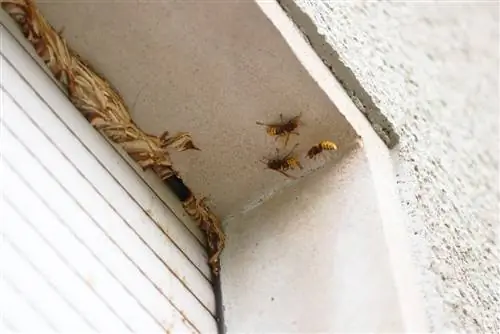
Hornet peoples only live for one summer. The queens look for a warm and protected crevice in which to hibernate over the winter. The remaining people, the worker hornets, die with the first frost at the latest. This means that the abandoned nest, which is not protected because it will not be populated again next summer, can be removed yourself. The area should be cleaned, which is especially important for nests on house walls. This can prevent the building structure from suffering from the hornets' excretions. This can also prevent a new nest from being built here next year.
Tip:
Anyone who has ever had hornets in their garden or house can assume that the queen will settle nearby again next summer. Then the insects can be provided with a place further away in the garden in a corner, for example in the form of a large wooden box or an insect hotel.
Conclusion
A hornet's nest may not simply be removed or disposed of due to the Nature Conservation Act. This could result in a severe pen alty. It is better to come to terms with the hornets over the summer and remove the nest after the hornet colony has given up after the first frost. Since the hornets are protected, it is not allowed to use chemical agents to get rid of the animals. In various cases in which acute danger could arise from a nest, the responsible nature conservation authority issues a special permit. In such a case, a specialist will relocate the hornet's nest and its colony to another location.

